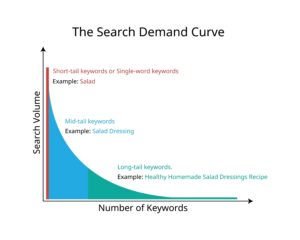The content that features on your website, while essential, is only as good as the selection of keywords that it’s targeting.
While it’s true that the higher quality content will naturally generate more appropriate keywords without taking away from your company’s market strategy, it’s useful to familiarise yourself with the types of keywords and how to use them to maximise your SEO.
We’ve broken down different types of keywords and how you can use them to get the most out of your SEO strategy.
Keywords based on length

Keywords can have different lengths depending on their purpose. Their length comes down to how many words it consists of, so let’s delve into what these lengths are and what they aim to do:
Short-tail
Starting small, short-tail keywords usually consist of no more than two words. Sometimes referred to as Seed Keywords or head terms, they are used to search for general information and are the first words you might think of when trying to describe a company like Embryo. Because they’re on the tip of the tongue, they are usually the first keywords used by customers as well.
Examples might include “Embryo”, “marketing” or “Google Analytics”
Due to their high search volume, short-tail keywords tend to generate lots of traffic to your website. However, because they’re so common and lack specificity, they’re highly competitive and don’t always produce exactly what the user wants. We wouldn’t generally advise you to try ranking for short-tail keywords right away, especially if your business is in its early stages. Targeting a cluster of short and long-tail keywords is the best approach.
For example, it’s more difficult to rank for “marketing agency”, when you haven’t specified what your marketing agency is, does, or what it’s offering any potential customers.
Instead, consider focusing on long-tail keywords that have a greater degree of purchasing intent. Over time, this will rank your website for less competitive search terms and attract an audience with a more defined intent.
Long-tail
Disproving the theory that less is more, these are search terms that consist of usually 3-7 words; long-tail keywords.
Focusing on more specific searches when you’re seeking to establish your company might feel counterintuitive. However, the specificity of long-tail keywords makes it easier for your brand to rank for these keywords on a search engine results page.
Their low search volume creates less competition and makes long-tail keywords more effective at driving qualified traffic towards your website. For example, instead of just searching “marketing agency”, users might search “digital marketing agency in Manchester” or “enhance SEO in digital marketing strategy” to get the exact results they’re after.
Long-tail keywords also have higher conversion rates. This is the number of users who buy the product they’ve clicked on. A conversion rate is calculated by dividing the number of visitors by the number of those who buy the product or service.
A good tool to use to find the best long-tail keywords is Google Suggest (also known as Google Autocomplete). For example, you might want to create a page about office spaces in Manchester, but “office space Manchester” is too vague. Instead, you could use “office space Manchester city centre” or “office space Manchester airport” to narrow your search and boost your page rankings.
Medium-tail
Predictably, in between the long and the short terms, are the medium tail ones. The Goldilocks terms, if you like. Medium-tail keywords are usually comprised of three words with decent specificity.
They tend to be less competitive than their simpler, short-tail counterparts but still generate a good level of search volume, whereas some long-tail keywords can take a little longer to gain traffic or conversions. Examples of medium-tail keywords could include “digital marketing Manchester”, or “SEO digital marketing”.
Keywords based on user intent:

As well as their size mattering, keywords can also be categorised based on user intent. This is especially important in terms of appealing to and maintaining the focus of your desired industry or niche.
Within this category, there are five main subcategories:
- Informational
- Navigational
- Commercial
- Transactional
- Local
1. Informational
These keywords prioritise finding answers and educating users on what they want to know. They have low conversion rates because they’re more about researching than buying, but they are incredibly important in establishing your company’s authority and niche. This is what Google’s SQRG (Search Quality Rater Guidelines) refers to as E-E-A-T.
Senior content manager, Shona Worsman, elaborates further:

“E-E-A-T stands for Experience, Expertise, Authority, and Trust.
This can come from things like author bios, correct use of external linking, or an about us page to name a few- these elements ensure a good user experience for someone on your site.
By adhering your content to all of these guidelines, you’re more likely to provide accurate and accessible information which also allows your company to introduce a product or service to an audience who already trusts you.”
Informational keywords usually include interrogative adverbs such as “how”, “what” and “why”. Examples might be “How to improve SEO strategy” or “What is a digital marketing agency”.
2. Navigational
Navigational keywords usually serve the purpose of getting the user to a specific website or product. They might include “LinkedIn login” or even just “Facebook”.
It’s a good idea to include separate pages on your website, for example, for pricing, contact details, or opening times, so that users can simply search “Embryo contact details”, and be taken to the exact page they’re looking for. We recommend that you also include your brand or product name on the home page, landing page, any blog posts, and key product and service descriptions.
3. Commercial
These keywords typically include adjectives that indicate that a user is looking to buy a specific product or service, but they might still be researching which one is most appropriate for their needs. Commercial keywords often make use of words like “best”, “Vs” and “most popular”.
An example of this type of keyword might be “best digital marketing services” or “most popular Google analytics course”.
4. Transactional
Transactional keywords tend to suggest that a user is ready to buy or to complete a transaction, such as signing up for a newsletter or downloading a paid application or eBook. Keywords like this usually include verbs like “buy”, “order” or “download”.
Examples of transactional keywords might be “buy SEO course” or “order office wear online”.
5. Local
Keywords which reference a specific geographic area in which a user is searching for a product or service are known as local search keywords. These searches can include the names of cities or neighbourhoods, or often even more location-specific landmarks. An example might be “digital marketing agency on Portland St” or “Manchester city centre office space”.
It’s worth noting when considering the design and accessibility of your website that local keywords tend to be more commonly searched on mobile devices when people are looking for something specific while they’re out and about.
Check out our YouTube video below where our Organic Lead, Amy Leach, explains how keywords differ and how they’re based on user intent!
Other types of keywords to consider for maximum SEO
There are a few more types of keywords that you might be able to identify on your website if your content is of a high quality. These keywords are all useful for boosting SEO, but it’s better to try and include them naturally to compliment your content, rather than shoehorning them in to try and improve the readability and rankings of your products and services.
LSI keywords
LSI is short for Latent Semantic Indexing. This relates to contextual keywords to help search engine crawlers understand the purpose of your content.
For example, take the word “apple”. If the search engine detects words like “fruit”, “bananas” or “crumble”, it will understand that you’re writing about the fruit because there is suitable ontology in there. However, if the crawlers find words like “iPhone”, “MacBook” or “iOS”, it will recognise that you mean the tech brand.
Trending keywords
These are context-dependent keywords, which will vary in popularity because of certain factors such as current events, times of the year, and weather conditions. Trending keywords are usually short-lived and easy to rank for, but it’s also important to produce high-quality content around these words to give your company the edge over other competitors.
For example, searches for “vegan Christmas dinner” or “Christmas party outfit” are much more common around the festive period rather than in the summer months – unless a user is extremely prepared, of course.
Evergreen keywords
Evergreen is the term used to describe keywords that are consistently relevant and remain popular. These search terms tend to drive search traffic and interest interminably.
Some examples of evergreen content might include: “how to minimise stress levels” or “cheap flights to Marbella”. The good thing about evergreen keywords is that they allow you to cultivate a sustainable content strategy which in turn creates a consistently engaged audience.

Ben Carter, SEO Account Manager here at Embryo, says that:
“Evergreen keywords can often be the ones that convert the most.
Those will normally be the more transactional keywords that get a user onto the site and then complete a desired action.
Always maintaining a focus on them is critical. Although the very specific, long-tail keywords can sometimes be easier to gain rankings for, it’s still worth going after evergreen keywords.”
However, it’s not always evergreen-er on the other side. The main issue with evergreen keywords is that, due to their consistent nature, evergreen topics tend to be broad and generic. This means that they will usually have been written about many times before. The challenge then is to produce something new and unique that proves to your audience that your website is the best source for what they’re looking for.
Keywords are key. At Embryo, we know that
Targeting the right terms is the difference between talking to the right audience and not. Not only do they help a user’s understanding, but the keywords you choose tell Google what your content is about. Choosing the correct types that ensure maximum SEO for your site adds a significant amount of strength to your strategy!
At Embryo, we undergo rigorous keyword research for our clients to ensure they’re speaking to the right audience.
To learn more about what we do, get in touch today.
FAQs
Answered by Amy Leach
What type of intent is behind short-tail keywords?
This tends to be people who know exactly what they are looking for. Usually, short-tail keywords are behind a commercial intent.
What type of intent is behind long-tail keywords?
Long tail tends to be from people asking questions about certain products and services. These search users want more information and tend to be asking questions.
What is the best way to include keywords in my content?
Keywords should be included in headings first and foremost. Make sure they are also sprinkled throughout your content as naturally as possible. Keyword stuffing is poor SEO practice.
Should each page have different keywords?
Yes. Multiple pages on your website going after the same keyword will probably flag as keyword cannibalism. You don’t want your pages competing against each other for the same keyword.
What type of keywords should a new business target?
A new website’s domain authority is likely to be lower. It may be easier to start with keywords which are long tail and less competitive. Creating pillar pages with key trophy terms is usually the best place to start for content creation.














